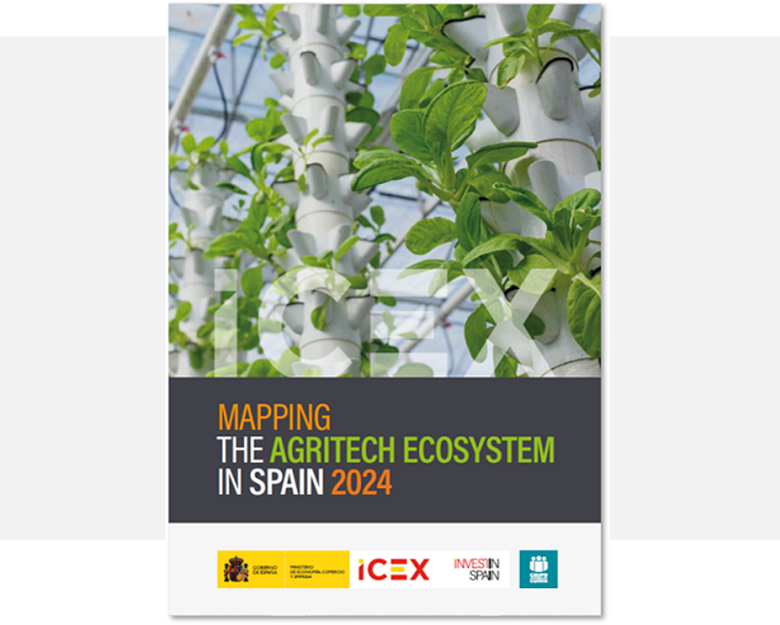Innovative foreign investment in Spain's Agritech industry

This first Agritech Ecosystem Map 2024 has been published by ICEX-Invest in Spain, in collaboration with Grupo Cooperativo Cajamar.
The study identifies new opportunities for investment companies that complement the value chain
Multinationals choose Spain as a base for their future developments, establishing their research and development centres in the country
Spain has become a European benchmark in Agritech, something which opens up new opportunities for foreign investment in the industry, especially in the field of RD&I. This is shown by the Agritech Ecosystem Map 2024, published by ICEX-Invest in Spain in collaboration with Grupo Cooperativo Cajamar.
The Map, the first of its kind in the industry, provides an X-ray of the current innovation ecosystem, highlighting its strengths, anticipating needs and promoting the attraction of new innovative projects as a lever for transforming agriculture and livestock and moving towards a more resilient, sustainable and digitised future model.
It is an effective tool for boosting networking, as it describes and facilitates contacts by the different key operators in the ecosystem (public authorities, research centres, technology centres, clusters, hubs, associations and multinationals).
The study does in this way underline the strategic nature of the agri-food industry, with a far higher contribution to the Spanish economy in terms of added value and employment than that for the EU as a whole. The larger size of the agri-food chain is based on two important facts: greater productivity and competitiveness and a strong drive to export agri-food products.
The data attests to its strength, as it has maintained a continuous growth path on the whole, and amounts to 114.140 billion euros. Spain is the fourth largest contributor of GVA to the EU, preceded by France, Germany and Italy. According to the report, the industry's value chain employed more than 2.3 million people in 2023.
The Map also identifies business opportunities for innovative companies in the field of technology for agriculture and livestock and emphasises the fact that Spain attracts foreign investment in RD&I, generating growth opportunities for global companies, while also strengthening local industry.
The content of the report is based on Grupo Cajamar's experience as a benchmark financial institution for the agricultural sector in Spain specialising in providing services and advice to companies and professionals. It is also based on its work as one of the main agents for imparting agricultural knowledge and training in Spain.
Spain – a destination for multinationals
Among its conclusions, it stresses that the agri-food industry is growing “unstoppably worldwide” and that Spain is now a destination for multinationals operating in the international agri-food industry, not only because of the potential of the industry, but also because of “its strategic position to establish itself as a base for developing new products and services to be exported to the rest of the world”.
An outstanding example is the vegetable seed sub-industry, where large multinationals have set up research and development centres, collaborating with Spanish technology companies to develop innovative solutions for each production phase.
In this context of growth, these companies have chosen Spain as a base for their future developments, establishing their research and development centres in the country, mainly in Almeria and Murcia. All of this is allowing a large part of the vegetable seeds used in the world to be developed in Spain.
Strategic partnerships
In addition, strategic partnerships between multinationals and Spanish technology companies are gaining more and more strength in the country, becoming a formula for growth and competitiveness in a global economy.
The Map also highlights that there is a “growing demand for sustainable solutions” in agriculture. In this scenario, agritech startups have become key players in developing technological innovations that improve the efficiency, productivity and sustainability of Spanish agriculture.
Among the technological demands of the industry, the report points to innovations related to water management, fertilisation, pest management, agricultural machinery and robotics, renewable energy and data management, traceability, and cybersecurity.
In this regard, there has been a striking growth in the number of agritech startups in Spain in recent years, and this reality “should be a trigger to continue working in the direction established,” according to the report. It also states that access to capital available to entrepreneurs is enabling the implementation of procedures, technologies or resources which were not previously available.
Finally, after analysing the industry in its different areas, the report concludes that, in view of the data and the technologies applied, the industry “has a considerable volume of incipient startups with major international importance, and Spain can be considered a power in the agritech ecosystem”.
You can download the report here.




